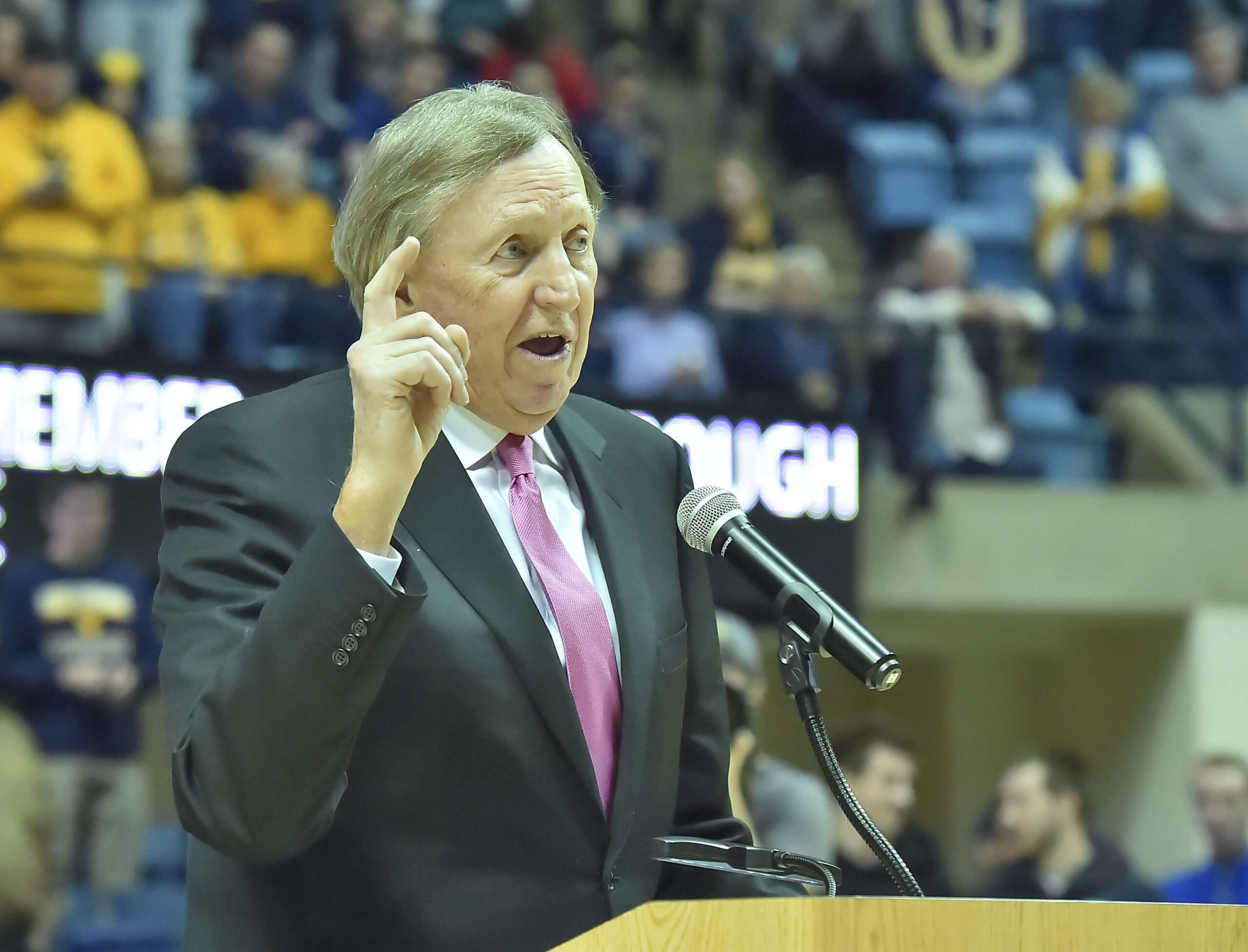MORGANTOWN, W. Va. — Forever hanging in the WVU Coliseum rafters is Rod Thorn and his No. 44, which was made official Saturday during a retirement ceremony at halftime of West Virginia’s 73-62 loss against Oklahoma
Sitting in section 226, Thorn’s image is nestled exactly 10 sections from Rod Hundley and 10 from Jerry West. Fitting in a way, because all three WVU legends were exactly four years apart during their college careers, which in the 1950s and 60s, meant they never had the chance to play in a game together.
“It does seem weird, doesn’t it?” Thorn said during a press conference.
It wasn’t until 1972 that freshmen were permitted to play varsity sports in the NCAA.
So, in 1956, West played on the freshman team at WVU, while Hundley was the senior star.
In 1960, Thorn, a native of Princeton, was the star of the freshman team as West concluded his All-American career with the Mountaineers.
Had just one of them been born a year earlier or later, there would have been an opportunity for West to compete with either Hundley or Thorn in what could have created a sort of WVU fantasy team competing for a national championship.
“I’ve often wondered about that,” Thorn said. “We had a really good freshman team and we practiced against the varsity a lot in the preseason.
“It would have been great. In Jerry’s junior year is when they went to final game. His senior year, they got upset, but it would have been great. Who knows what we would have done, but it would have been great.”
As it stands, all three were the next in line to carry the torch. West took it from Hundley and then passed it to Thorn, who went on to become an All-American, while leading the Mountaineers to two NCAA tournaments also wearing the same No. 44 as West.
“That is one thing if I had to do over, I wouldn’t have done,” Thorn said. “The pressure had nothing to do with the coaches. It had to do with me. I put a lot of pressure on myself to try to live up to be the next West, and nobody was going to do that.
“I had a tough time with that for a while. Then I realized you have to try and be the best player you can be, you’re not going to be the next Jerry West. After that, it was fine.”
Thorn’s NBA career covered eight seasons and four teams. He was the No. 2 overall pick of the 1963 draft to Baltimore, who traded him to Detroit after his rookie season. He also played in St. Louis and was taken by Seattle in the 1967 expansion draft, where he played his final four seasons before retiring after the 1970-71 season.
Thorn said he was talked out of law school to get into coaching by former teammate Kevin Loughery, who was then the head coach of the New York Nets of the American Basketball Association.
And if Thorn was forced to follow the greatness of West in college, well, he never quite escaped greatness as a coach and NBA general manager, either.
That first year as an assistant with the Nets, New York won the ABA title.
Why? “We had Dr. J,” Thorn said of NBA Hall of Famer Julius Erving.
In 1978, Thorn became the general manager of the Chicago Bulls, which set him up to draft Michael Jordan in 1984.
“I think that’s probably what I’m known more than anything else,” he said. “If you’re going to be known for something, that’s not a bad thing to be known by.”
Known as a great evaluator of talent, Thorn was a chairman on the selection committee that put together the 1992 “Dream Team” for the Barcelona Olympics.
He was named the NBA’s Executive of the Year in 2002 when he was the general manager of the New Jersey Nets. Thorn was able to pull off an offseason trade with Phoenix that brought Jason Kidd to the Nets, a move that helped New Jersey reach the 2002 and 2003 NBA Finals.
From West to Dr. J to Jordan and Kidd, all them Naismith Memorial Basketball Hall-of-Famers, and Thorn joined them there as a contributor to the game in 2018. He still proudly sports his gold Hall-of-Fame ring on his left hand.
His honor on Saturday, Thorn said, was another achievement in his storied career that would never be forgotten.
“He’s as West Virginian as anybody is,” WVU head coach Bob Huggins said. “He means just as much to West Virginia University as anybody does. He’s been good to me since I was a player here.”
TWEET @bigjax3211




